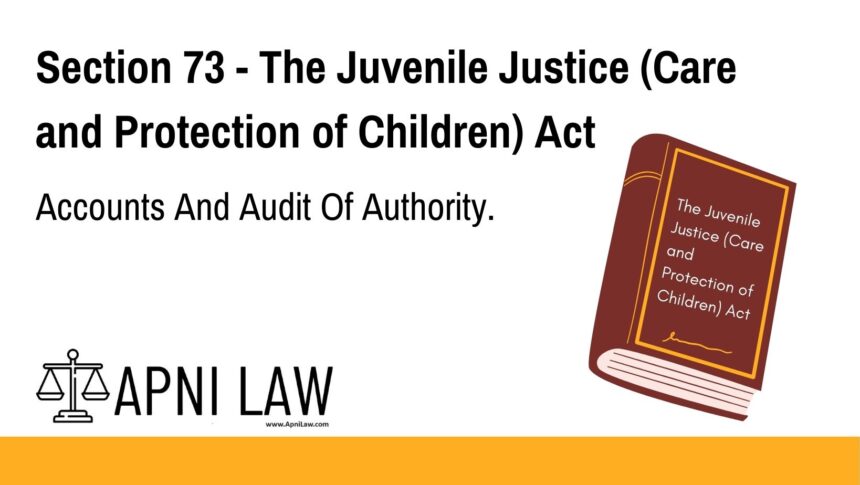Code: Section 73 of The Juvenile Justice (Care and Protection of Children) Act, 2015
(1) The Authority shall maintain proper accounts and other relevant records and prepare an annual statement of accounts in such form as may be prescribed by the Central Government in consultation with the Comptroller and Auditor-General of India.
(2) The accounts of Authority shall be audited by the Comptroller and Auditor-General at such intervals as may be specified by him and any expenditure incurred in connection with such audit shall be payable by the Authority to the Comptroller and Auditor-General.
(3) The Comptroller and Auditor-General and any person appointed by him in connection with the audit of the accounts of the Authority under this Act shall have the same rights and privileges and authority in connection with the audit of Government accounts and, in particular, shall have the right to demand the production of books, accounts, connected vouchers and other documents and papers and to inspect any of the offices of Authority.
(4) The accounts of the Authority as certified by the Comptroller and Auditor-General or any other person appointed by him in this behalf, together with the audit report thereon shall be forwarded annually to the Central Government by the Authority.
(5) The Central Government shall cause the audit report to be laid, as soon as may be after it is received, before each House of Parliament.
Explanation of Section 73 JJ Act
Section 73 outlines the rules for maintaining and auditing the financial records of the Authority established under the Juvenile Justice Act. This section ensures financial transparency, proper bookkeeping, and government oversight.
The Authority is required to maintain accurate financial records. Every year, it must prepare an annual statement of accounts. The format for this statement is decided by the Central Government in consultation with the Comptroller and Auditor-General (CAG) of India.
The CAG is responsible for auditing these accounts at intervals determined by him. The cost of the audit is paid by the Authority. During the audit, the CAG has the same powers as when auditing any other government body. He can inspect offices and request documents, books, and vouchers.
Once the audit is completed, the certified accounts and the audit report must be submitted to the Central Government. The government, in turn, is required to lay the audit report before both Houses of Parliament.
Key Highlights:
- The Authority must maintain accurate records and annual accounts.
- The Comptroller and Auditor-General audits the accounts at regular intervals.
- The CAG can inspect offices and demand financial documents.
- The certified accounts and audit report go to the Central Government.
- The government must present the report to Parliament.
Illustration
Let’s say the Central Adoption Resource Authority (CARA) receives government grants to run national adoption programs. Under Section 73, CARA prepares its annual financial statement in the prescribed format. The Comptroller and Auditor-General then audits the accounts. During the audit, the CAG’s office inspects CARA’s records and office files. After completing the audit, a report is prepared and certified. CARA sends the report to the Central Government, which then places it before Parliament.
Common Questions & Answers on Section 73 JJ Act
1. Why does the Authority need to maintain accounts?
Proper financial records ensure transparency, prevent misuse of funds, and allow government oversight.
2. Who audits the accounts of the Authority?
The Comptroller and Auditor-General (CAG) of India audits the accounts, either directly or through an appointed representative.
3. Can the CAG inspect any office of the Authority?
Yes. The CAG can inspect offices and request documents during the audit, just like in government audits.
4. Who pays for the audit?
The Authority pays any costs related to the audit process.
5. What happens after the audit?
The Authority sends the certified accounts and the audit report to the Central Government, which must then lay it before Parliament.
Conclusion
Section 73 plays a vital role in ensuring financial accountability under the Juvenile Justice Act. It mandates that the Authority must keep accurate records, undergo regular audits by the CAG, and be fully transparent with the government and Parliament. This ensures that public funds are used properly and child welfare programs operate responsibly.
For more section-wise legal explanations, visit ApniLaw.








